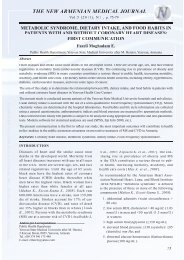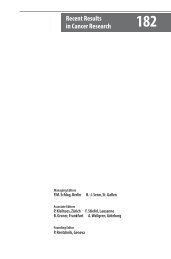Acute Leukemias - Republican Scientific Medical Library
Acute Leukemias - Republican Scientific Medical Library
Acute Leukemias - Republican Scientific Medical Library
Create successful ePaper yourself
Turn your PDF publications into a flip-book with our unique Google optimized e-Paper software.
a 19.3 · Getting to Know Chemotherapy: The Role of Pharmacogenetics and Mechanisms of Drug Resistance 243<br />
cleosides and 2'-deoxyribose-a-1-phosphate. PNP deficiency<br />
or inhibition suppresses the proliferation of human<br />
T-cells due to subsequent accumulation of deoxyguanosine<br />
triphosphate (dGTP), which leads to allosteric<br />
inhibition of ribonucleoside diphosphate reductase<br />
(RNR), an enzyme necessary for DNA synthesis.<br />
As patients with inherited PNP deficiency are characterized<br />
by profound suppression of T-cell immunity, inhibition<br />
of this purine salvage enzyme is predominantly<br />
targeted at T-cell hematologic malignancies although<br />
in vitro studies indicated that B-lineage ALL cells are<br />
susceptible to PNP inhibition as well.<br />
Several phase I and II trials are underway to investigate<br />
the safety profile and clinical activity of forodesine<br />
in patients with advanced T-cell malignancies. In<br />
a phase I/II multicenter dose escalation study, 15 patients<br />
with various hematologic malignancies (including<br />
six patients with B-lineage ALL) received forodesine at<br />
doses from 40 mg/m 2 up to 135 mg/m 2 intravenously<br />
(typically given every 12 h for 4 days following one single<br />
infusion in the first day) [49]. There was one complete<br />
response at 135 mg/m 2 and hematologic benefits<br />
for six other patients (including five with ALL). Maximum<br />
PNP inhibition was achieved at 40 mg/m 2 . Duvic<br />
et al. treated 13 patients with cutaneous T-cell lymphoma<br />
(CTCL) or Sezary syndrome with forodesine at dose<br />
between 40 mg/m 2 and 135 mg/m 2 per infusion [50].<br />
They report one complete and two partial responses.<br />
Overall, nine patients showed at least an improvement<br />
in skin lesions and/or a pharmacodynamic response.<br />
A phase II study of forodesine in relapsed T-cell ALL<br />
is being conducted at MD Anderson Cancer Center.<br />
An oral formulation of forodesine will become available<br />
for clinical studies in the near future.<br />
19.3 Getting to Know Chemotherapy:<br />
The Role of Pharmacogenetics<br />
and Mechanisms of Drug Resistance<br />
Although development of new drugs remains crucial,<br />
further understanding of the pharmacodynamics and<br />
pharmacokinetics of existing agents can help to increase<br />
their efficacy. Considerations of drug metabolism<br />
and pharmacogenetics are therefore becoming increasingly<br />
important to assess sensitivity to chemotherapy<br />
and prognosis. Many antineoplastic agents display a<br />
wide range of interpatient variability of their steady<br />
state plasma and intracellular levels, which may influ-<br />
ence response and outcome to therapy [51]. Polymorphisms<br />
in expression of various genes account for differences<br />
in drug absorption, distribution, and metabolism.<br />
Thymidylate synthase (TS) is an important target of<br />
methotrexate. Homozygosity for a triple-tandem repeat<br />
polymorphism of the TS gene has been associated with<br />
increased levels of the enzyme, and with worse prognosis<br />
in children with ALL [52]. Polymorphisms of<br />
the methylenetetrahydrofolate reductase (MTHFR) gene<br />
have been correlated with a higher incidence of adverse<br />
events, but also greater sensitivity of leukemic blasts to<br />
methotrexate [53, 54]. In a study by Evans et al., patients<br />
with low methotrexate concentrations had significantly<br />
shorter CR durations and methotrexate clearance was<br />
an independent prognostic factor for remission duration<br />
[55]. Polymorphisms affecting the thiopurine<br />
methyltransferase (TPMT) gene may likewise lead to increased<br />
sensitivity to 6-mecaptopurine, to a higher risk<br />
of acute hematopoietic adverse events, but also to a<br />
more favorable leukemia-free survival [56]. Most of<br />
these studies have been conducted in children with<br />
ALL and it is unknown how these pharmacokinetic<br />
variables contribute to the outcome in adult ALL. There<br />
is growing interest in adult ALL as well, to designing<br />
programs that allow monitoring of pharmacogenetic<br />
properties and individualize dose and schedule of therapy<br />
accordingly.<br />
Differences in sensitivity of ALL cells to chemotherapy<br />
are also based on cytogenetic-molecular characteristics<br />
determining, among other things, drug disposition<br />
and clearance [51]. Several karyotype abnormalities<br />
have been described that have been associated with altered<br />
responsiveness to therapy. Patients with hyperdiploid<br />
cytogenetics are highly sensitive to antimetabolite-type<br />
chemotherapy. In many cases, the leukemic<br />
cells of these patients harbor additional copies of a gene<br />
coding for cellular methotrexate transporters, and higher-than-average<br />
concentrations of intracellular methotrexate<br />
polyglutamates have been demonstrated in vitro<br />
after treatment with methotrexate in leukemic blasts of<br />
these patients [57]. Patients whose cells harbor a TEL-<br />
AML1 fusion [as seen in translocation t(12;21)] are more<br />
sensitive to asparaginase [58]. ALL with translocation<br />
t(4;11) and MLL rearrangements have increased sensitivity<br />
to cytarabine possibly by overexpression of cellular<br />
cytarabine receptors [59]. Phenotypes resistant to<br />
standard doses of methotrexate include T-lineage ALL<br />
where high doses of methotrexate have been associated<br />
with better outcome and ALL associated with transloca
















